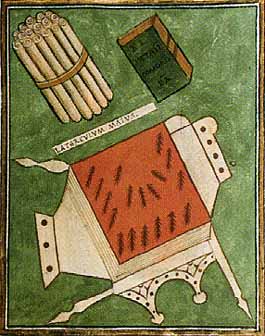|
Primicerius Sacri Cubiculi
The Latin term ''primicerius'', hellenized as ''primikērios'' ( el, πριμικήριος), was a title applied in the later Roman Empire and the Byzantine Empire to the heads of administrative departments, and also used by the Church to denote the heads of various colleges. Etymologically the term derives from ''primus in cera'', which is to say ''in tabula cerata'', the first name in a list of a class of officials, which was usually inscribed on a waxed tablet. Civil and military From their origin in the court of the Dominate, there were several ''primicerii'' (''primikērioi'' in Greek, from the 12th century usually spelled ''primmikērioi''). In the court, there was the ''primicerius sacri cubiculi'' (in Byzantine times the ''primikērios'' of the ''kouboukleion''), in charge of the emperor's bedchamber, almost always a eunuch. The title was also given to court officials in combination with other offices connected to the imperial person, such as the special treasury (''eidi ... [...More Info...] [...Related Items...] OR: [Wikipedia] [Google] [Baidu] |
Latin
Latin (, or , ) is a classical language belonging to the Italic branch of the Indo-European languages. Latin was originally a dialect spoken in the lower Tiber area (then known as Latium) around present-day Rome, but through the power of the Roman Republic it became the dominant language in the Italian region and subsequently throughout the Roman Empire. Even after the fall of Western Rome, Latin remained the common language of international communication, science, scholarship and academia in Europe until well into the 18th century, when other regional vernaculars (including its own descendants, the Romance languages) supplanted it in common academic and political usage, and it eventually became a dead language in the modern linguistic definition. Latin is a highly inflected language, with three distinct genders (masculine, feminine, and neuter), six or seven noun cases (nominative, accusative, genitive, dative, ablative, and vocative), five declensions, four verb conjug ... [...More Info...] [...Related Items...] OR: [Wikipedia] [Google] [Baidu] |

